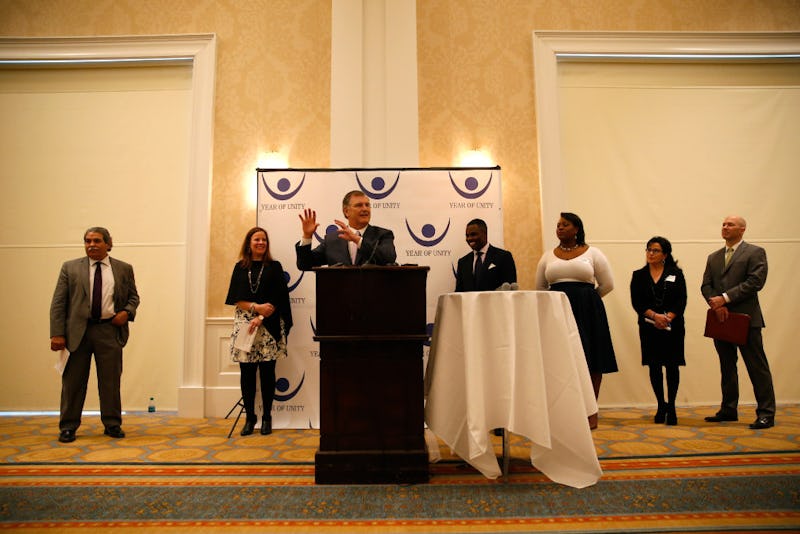(Dallas Morning News | James Ragland, Columnist | Commentary) I was just about ready to sing Kumbaya until the pastor, who apparently has heard me hum a few bars, saved the day.
“We’re not here to sing Kumbaya,” the Rev. Richie Butler, senior pastor of St. Paul United Methodist Church, told those gathered Tuesday morning at the Belo Mansion to talk about Butler’s pet project — the Year of Unity.
The YOU, as Butler succinctly calls it, is one of those acronyms that suggests no one is off the hook. And if Butler has his way, you, I, the 43rd president of the United States — all of us — will come together as partners in a yearlong mission to improve race relations in Dallas and beyond.
The idea took root after five police officers were fatally shot last summer by a deranged Army Reservist who not only sabotaged a Black Lives Matter rally in downtown Dallas but sent the city and the nation into a tailspin.
The ambush happened in the heart of Dallas, but it drove a stake in the heart of our nation, putting a violent exclamation point on the escalating tensions between police and minority communities across the country.
In steps Butler, the dynamic, visionary leader of a historic black church founded by slaves, hoping to free us from ourselves and cleanse us of the racial toxicity that poisoned the air that day.
The lingering question, he said, is this: “How do we use this moment to lift us to a movement?”
Butler didn’t come down the mountain with a stone tablet in hand, but when he stepped up to the lectern, he was no less commanding. Over the course of the next year, he wants all of us to adhere to three golden rules: Listen. Learn. And Engage.
“Listen to somebody else’s story, somebody who doesn’t look like you, somebody who’s not from your neighborhood,” he said. “Learn — don’t prejudge or go on preconceived notions.”
And engage, he said, in deliberate, “intentional” activities aimed at bridging the racial and cultural divide.
Butler founded Project Unity, a program operating under the umbrella of the nonprofit Union Development Corp., as the vehicle to help deliver on his promises. He already has an impressive list of heavy hitters on board: Former President George W. Bush is honorary chair.
Honorary co-chairs include Dallas Mayor Mike Rawlings; Olympic gold medalist Michelle Carter; Dallas entrepreneur Arcilia Acosta, the CEO of CARCON Industries and STL Engineers; Galileo Jumaoa, president of the Greater Dallas Asian American Chamber of Commerce; Almas Muscatwalla, co-chair of the Interfaith Council and board member of the Thanks-Giving Foundation; Paul Quinn College President Michael Sorrell; and Dr. Brian Williams, the associate professor of surgery at UT Southwestern who treated victims of the police ambush at Parkland Memorial Hospital.
What Butler and his team did is put together a series of programs and initiatives called “Together We,” which is designed to bring cross sections of the community together in different settings.
On July 8, “Together We Heal: A Day of Healing,” will bring law enforcement officers and residents together for a day of fun and reflection “to help our city heal.”

Another program, “Together We Learn,” will teach students —starting with about 300 from Madison High School — how to respond to and interact with police during traffic and pedestrian stops.
“That’s where we are going to start, and we may expand from there,” said Dallas ISD Superintendent Michael Hinojosa, a Project Unity “ambassador.”
Rawlings said that the beauty of Project Unity is that it demands each of us to assume some responsibility for uniting the city.
“The great Satchel Paige once said that none of us is as great as all of us,” Rawlings said, adding. “The key is that when you realize you’re doing the right thing on ‘heart’ issues, you can accomplish it by coming together. That doesn’t mean you don’t have conflicts. I think conflict is a positive thing; it needs to be constructive conflict, though.”
The mayor, borrowing a page from the annual Dallas Dinner Table program that brings diverse folks together over a meal, said his “first step is to eat with people, to break bread with people I don’t normally break bread with.”
And then, channeling his enthusiasm toward me, Rawlings said “everybody” should break bread with someone from a different circle. “If we do that one thing, I think we’ll come together.”
One thing is certain: Nothing will get better if we don’t try.
Consider me a disciple of Butler’s healing gospel, which is grounded in one fundamental belief: “That which unites us,” Butler said, “is greater than what divides us.”
(You can find out more about Project Unity and The Year of Unity by visiting www.projectunity.net)